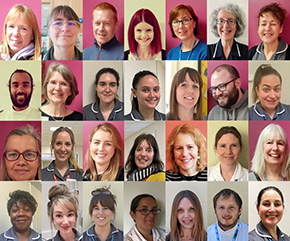Research & Development |
D1
|
About us
 We are very proud to be a research active hospital and our department plays a vital part in this work.
We are very proud to be a research active hospital and our department plays a vital part in this work.
Our studies take place across lots of hospital departments and often involve working together with other hospitals, universities, charities and businesses.
Being treated in a research active Trust will benefit you, even if you do not take part in research yourself. Good evidence says that patients achieve better outcomes in a research active hospital.
What is health and social care research?
There are many different types of research. Some studies develop new treatments or collect samples. Others use surveys or interviews to understand the views of people. This helps our researchers to learn new information.
Health and social care research benefits everyone. It also provides evidence about what works best. We can use this evidence to improve our decisions about diagnosis and care. All our research must follow strict legal standards, so that your safety comes first.
You may wish to find out more information about health and social care research. A useful website is:
Specialties where research is taking place at the RUH:
Please note - information about the specialties (greyed-out) will be added when new research takes place.
|
Diabetes, lipids and endocrinology Haematology |
Maternity, Obstetrics and Gynaecology Oncology |
Surgery |
|
Our research networks
Research groups and networks are helpful to us. They allow us to share results from research and discuss new ideas. We also use them to decide priority topics for research or to review funding options. Some groups focus on only one health condition. Others involve a wide range of research opportunities.
A research group can be a small number of people in one place, such as here at the RUH. Some groups involve people from other hospitals or universities. Networks are usually larger. They can involve people at a regional, national or even international level. We are a member of the Clinical Research Network West of England.
For more information about their work, go to:
Clinical Research Network West of England

